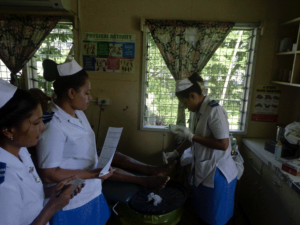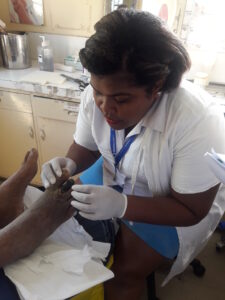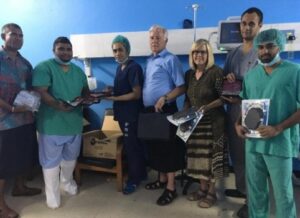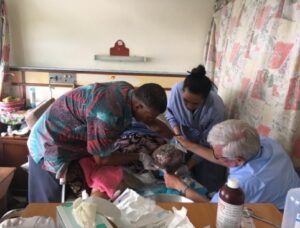Foot Care
 Diabetes Fiji Inc in partnership with Ministry of health and Medical Services rolled out the Primary Level Diabetes Care Capacity Building Project in 2013, with a view to Strengthening primary level Diabetes care and promoting diabetes awareness, through the support of World Diabetes Foundation.
Diabetes Fiji Inc in partnership with Ministry of health and Medical Services rolled out the Primary Level Diabetes Care Capacity Building Project in 2013, with a view to Strengthening primary level Diabetes care and promoting diabetes awareness, through the support of World Diabetes Foundation.
The choice of this Goal reflects a desire to optimise the clinical management of diabetics and to decrease the morbidity related to Diabetic sepsis and amputations. Based on NCD Steps Survey in 2002 and other anecdotal studies, Diabetes remains a major burden for the Ministry and the prevalence currently stands at 16.2%. The prevalence has increased 4-fold in less than 2 decades, from 4% in 1985 to 16% in 2002. There is also lack of awareness among people of their diabetic status and only 12% who were part of 2002 NCD Step survey were controlled with medication. Ministry of Health of Health’s Annual report also states that the admission to hospitals for Diabetes and its complications doubled over the past years.
 The economic burden from the disease is also demonstrated by staggering 20% of offshore expenditure by Fiji Spent on Diabetes related complications. Further, according to the World Health Report (2003) and about 6% of the health budget is spent on Diabetes. Diabetes accounts for about 5% of admissions to surgical units and in many cases patients undergo 5-7 surgical intervention before amputation. The amputation rate from Diabetes has been gradually increasing from 20 to 36 per 100 admissions over the past 5years. There were total of 1445 admissions for Diabetes and its complications in 2009 of which 32% had ulcers, 4% had renal complications and 3% with eye complications such as cataract, background and proliferative retinopathy.
The economic burden from the disease is also demonstrated by staggering 20% of offshore expenditure by Fiji Spent on Diabetes related complications. Further, according to the World Health Report (2003) and about 6% of the health budget is spent on Diabetes. Diabetes accounts for about 5% of admissions to surgical units and in many cases patients undergo 5-7 surgical intervention before amputation. The amputation rate from Diabetes has been gradually increasing from 20 to 36 per 100 admissions over the past 5years. There were total of 1445 admissions for Diabetes and its complications in 2009 of which 32% had ulcers, 4% had renal complications and 3% with eye complications such as cataract, background and proliferative retinopathy.
Given the above status of a diabetic related complication which has led to a major burden for the Ministry of Health in Fiji, a systematic and comprehensive approach is required.
Considering the broad nature of Diabetes related issues, the project focused mainly on clinical management and prevention of diabetic footcare in Fiji.



 Today the project has trained to train more than 400 nurses, 350 Physicians, and 120 other specialties such as Dietitians, Physiotherapists, Counselors, Community Rehabilitation Assistants and Community Health Workers, etc in foot care. Established 15 dedicated foot clinics from the 3 pre-existing and equipped more than 80% of health facilities with a basic podiatry toolkit. Trained 32 nurses from 8 countries in the Pacific and provide support to young diabetics in the Pacific during a disaster. Established 32 Diabetes Peer support groups in communities with a high rate of default clinics and people with other comorbidities, conduct 5 Juvenile Camps, and provided consumables for 200 children that are insulin-dependent. Screened more than 50,000 Fijians in the communities.
Today the project has trained to train more than 400 nurses, 350 Physicians, and 120 other specialties such as Dietitians, Physiotherapists, Counselors, Community Rehabilitation Assistants and Community Health Workers, etc in foot care. Established 15 dedicated foot clinics from the 3 pre-existing and equipped more than 80% of health facilities with a basic podiatry toolkit. Trained 32 nurses from 8 countries in the Pacific and provide support to young diabetics in the Pacific during a disaster. Established 32 Diabetes Peer support groups in communities with a high rate of default clinics and people with other comorbidities, conduct 5 Juvenile Camps, and provided consumables for 200 children that are insulin-dependent. Screened more than 50,000 Fijians in the communities.